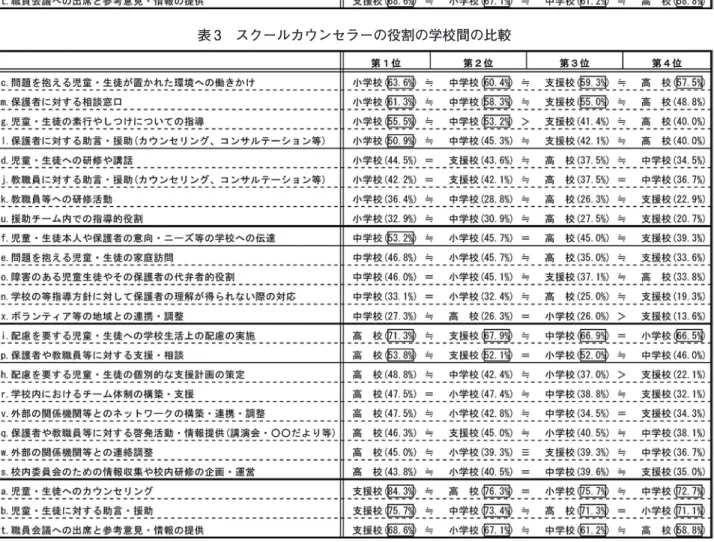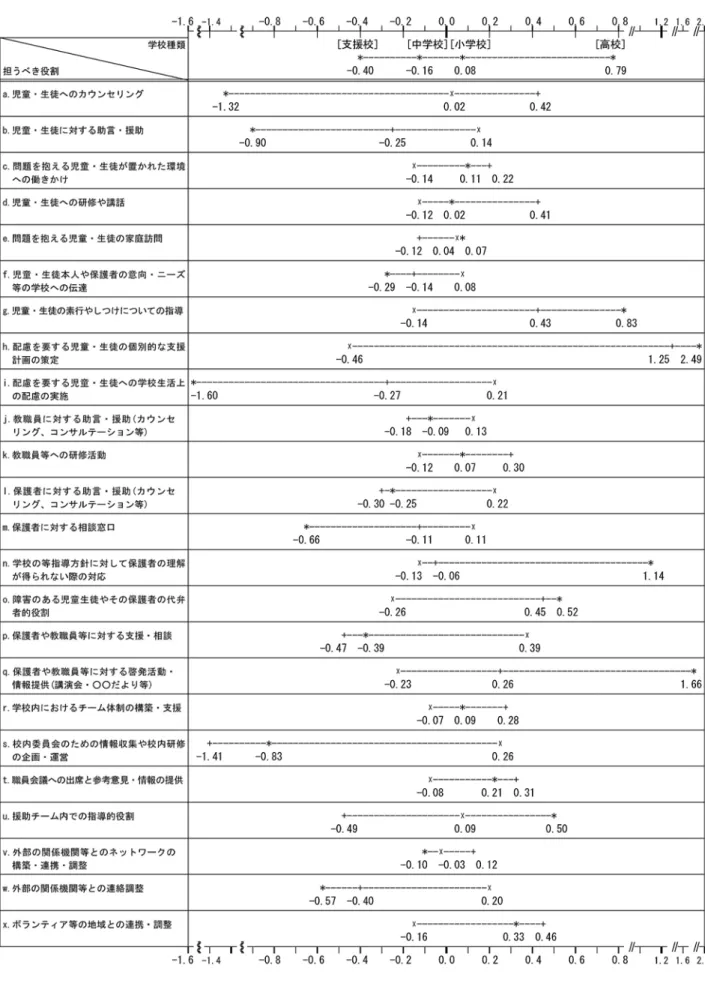特別支援教育に関する研究(3)
─養護教諭が認識する特別支援教育関連職種の役割の比較─
A Research of the Special Support Education (3):
Comparison of the Roles of the Special Support Education Connection Job Perceived by Yogo Teachers
林 幸範・石橋祐子
1)・太田裕生
2)・今林俊一
3)・石原正仁
4)・林 廣徳
5)HAYASHI, Yukinori
・ISHIBASHI, Yuko
・OTA, Michio
・IMABAYASHI, Shunichi
ISHIHARA, Masahito
・HAYASHI, Hironori
Abstract
This resarch was carried out to make the roles of national yogo teachers in the special support education clear, and 539 answers from yogo teachers (a recovery: 30.4%) were obtained in the country. The results analyzed by Hayashi’s quantification methods II were as follows:
① The role of “the yogo teachers”: Yogo teachers of elementary school (1 items); “Instruction about the conduct and the discipline of students”. 2) Yogo teachers of junior high school (4 items); “Home visit of students with a problem,” “Development of the individual support plan of students needing consideration,” “Enlightenment activity and offer of the information for the student’s parents and the teachers etc.,” “Construction,cooperation,adjustment of the network with outside organizations”. 3) Yogo teachers of high school (4 items); “Counseling to students,” “Advice,assist for students,” “Development of the individual support plan of students needing consideration,” “Role of the spokesman of an handicaped students and the student’s parents”. 4) Yogo teachers of special support school (1 items); “Transmission to schools such as intention, the need of students and the protector”.
② The role of “special support education coordinators”: 1) Yogo teachers of elementary school (3 items); “Development of the individual support plan of students needing consideration,” “Enforcement of the consideration in the school life to students needing consideration,” “The attendance and offer of a reference opinion, the information to a staff meeting”. 2) Yogo teachers of junior high school (3 items); “The training and lecture to students,” “Construction,support of the team system in the school,” “A plan,administration of intelligence and the campus training for campus committees”. 3) Yogo teachers of high school (1 items); “Cooperation, adjustment with the areas such as volunteers”.
キーワード:特別支援教育、養護教諭、特別支援教育の役割
Keywords: the Special Support Education, Yogo Teacher, a role of the Special Support Education
1.はじめに
平成19 (2007) 年から公立小中学校を中心に「特別支援 教育」が開始され、様々な支援体制が取られている。こ の支援体制の中核を担うのが、特別支援コーディネータ ーや校内委員会等で、これらの校務分担の中心となって いるのが養護教諭である。だが、特別支援教育を推進す るための養護教諭の役割や校内委員会の活性化に向けた 養護教諭のかかわり方など、特別支援教育を養護教諭の 立場で研究したものはほとんどない。さらに、学級担任 に向けた特別支援関連の書籍は数多く出版されているが、 養護教諭に向けた特別支援教育関連の書籍はほとんどな く、「特別支援教育と保健室の連携」等についての研究論 文も極めて少ない。そこで、平成 22 (2010) 年に足立区、 さらに平成23 (2011) 年に全国規模の調査を実施し、その 結果を報告してきた1)2)3)4)5)6)7)8)9)10)。 1) 石橋祐子(帝京科学大学 准教授)(Teikyo University of Science)2) 太田裕生(NPO 人間科学研究所 研究委員)(NPO Human Science Research Institute)
3) 今林俊一(鹿児島大学 教授)(Kagoshima University) 4) 石原正仁(こども教育宝仙大学 助教)(Hosen College of
Childhood Education)
表 2 養護教諭の役割の学校間の比較
注:1)「支援校」は、特別支援学校の略
注:1)「支援校」は、特別支援学校の略
図 3 学校校種とスクールソーシャルワ-カ-の役割との結果
注:1)「支援校」は、特別支援学校の略
注:1)「支援校」は、特別支援学校の略

